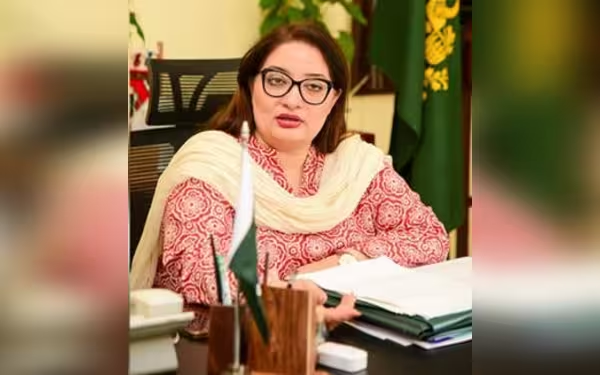Thursday, November 7, 2024 01:22 PM
Romina Khurshid Alam Advocates Business Leaders' Role in Sustainable Development
- Business leaders crucial for sustainable development in Pakistan.
- Collaboration with SIEF to tackle climate and socio-economic challenges.
- Inclusivity and technology essential for achieving sustainable goals.
 Image Credits: nation_pk
Image Credits: nation_pkRomina Khurshid Alam emphasizes the vital role of business leaders in achieving sustainable development in Pakistan through collaboration and innovation.
In recent years, the importance of sustainable development has gained significant traction across the globe. As nations grapple with pressing issues such as climate change, poverty, and inequality, the role of business leaders in driving sustainable practices has become increasingly crucial. In Pakistan, the government is actively seeking to enhance collaboration with various stakeholders, including countries and non-governmental organizations, to achieve the United Nations’ Sustainable Development Goals (SDGs).
During a meeting held in Islamabad, Romina Khurshid Alam, the Coordinator to the Prime Minister on Climate Change, emphasized the government’s commitment to fostering partnerships that can lead to meaningful progress in sustainable development. She met with a high-profile delegation from Yuanhe Holdings and the Green and Low-Carbon Committee of the Sino-International Entrepreneurs Federation (SIEF). The discussions centered around the need for collaboration in areas such as environmental sustainability, climate resilience, and socio-economic development.
Romina Khurshid Alam stated, "Engaging with development partners and countries that possess sound technical know-how and expertise is a top priority for our government." This approach aims to address critical issues like poverty reduction and gender empowerment, which are integral to achieving a sustainable future. The SIEF delegation, led by Dr. Ma Chengliang, expressed their commitment to working alongside Pakistan to tackle these challenges.
One of the key points raised during the meeting was the necessity of inclusive development. Romina highlighted that inclusivity is essential for sustainable development, ensuring that the voices of marginalized and resource-poor communities are heard in decision-making processes. She remarked, "Collaboration at any level and in any form for sustainable development is essential to address the interconnected challenges facing our world, such as climate change, poverty, inequality, and the depletion of natural resources." This sentiment underscores the importance of collective action in overcoming global challenges.
Moreover, the role of technology and innovation in achieving sustainable development goals cannot be overstated. Romina pointed out that advancements in renewable energy technologies and data-driven decision-making tools are vital in addressing environmental challenges. She stated, "Collaboration between the tech sector, research institutions, and governments can accelerate the development and deployment of sustainable technologies." This highlights the need for a multi-faceted approach that leverages the strengths of various sectors.
Dr. Ma Chengliang, the head of the SIEF delegation, praised the Pakistani government’s vision for an environmentally sustainable and climate-resilient future. He noted that integrating sustainability into business operations not only enhances operational efficiencies but also improves brand reputation and employee engagement. He stated, "Sustainability is becoming a key factor in consumer purchasing decisions, with many individuals actively seeking products and services from companies committed to environmental stewardship and social responsibility." This shift in consumer behavior reflects a growing awareness of the importance of sustainability in business practices.
As the world stands at a critical juncture, the collaboration between Pakistan and the SIEF presents a unique opportunity to address socio-economic and environmental challenges while unlocking new business prospects. The commitment to sustainable development is not just a governmental responsibility; it is a collective endeavor that requires the active participation of business leaders, civil society, and communities.
The path to sustainable development is paved with collaboration, innovation, and inclusivity. As stakeholders come together to tackle pressing global issues, the potential for creating a better future for all becomes increasingly attainable. The ongoing dialogue between the Pakistani government and international organizations like SIEF serves as a testament to the power of partnership in achieving a sustainable and equitable world.













